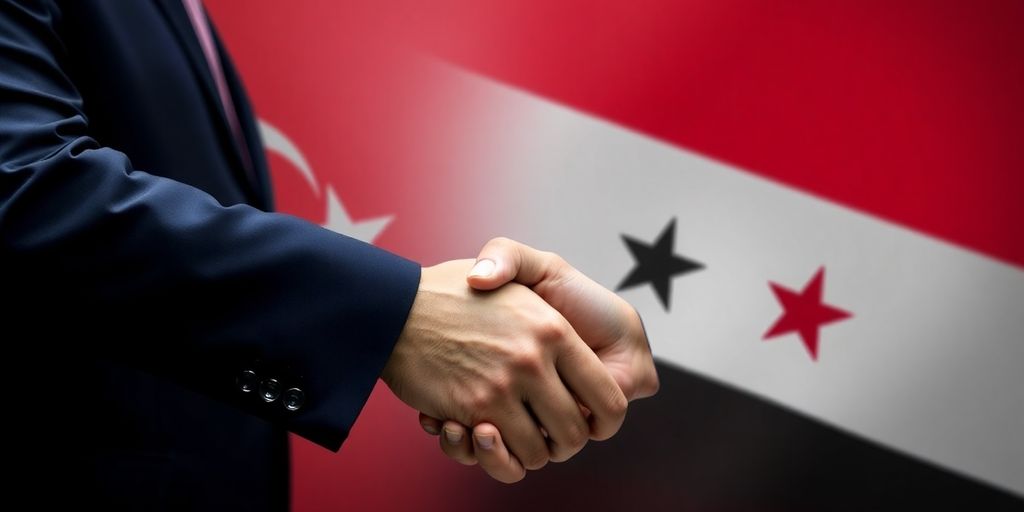In a significant diplomatic move, Turkish President Tayyip Erdogan met with Syrian President Ahmed al-Sharaa in Istanbul on May 24, 2025. This meeting comes on the heels of announcements from the U.S. and EU regarding the lifting of sanctions on Syria, aimed at aiding the country’s recovery from years of civil war.
Key Takeaways
- Erdogan expressed Turkey’s support for the lifting of U.S. and EU sanctions on Syria.
- The meeting included high-level officials from both countries, indicating a strengthening of bilateral relations.
- Discussions focused on the integration of Kurdish forces into the Syrian military, a contentious issue for Turkey.
Context of the Meeting
The meeting between Erdogan and Sharaa marks a pivotal moment in Turkish-Syrian relations, which have been strained since the onset of the Syrian civil war. Turkey has been a significant player in the region, supporting various rebel factions against the Assad regime. However, with the recent changes in the geopolitical landscape, Turkey is now positioning itself as a key ally of the new Syrian leadership.
Erdogan’s office stated that the Turkish president welcomed the recent decisions by the U.S. and EU to lift sanctions, which had been in place for over a decade. These sanctions were initially imposed to pressure the Assad regime amid widespread human rights violations during the civil war.
High-Level Attendance
The meeting was attended by several high-ranking officials, including:
- Turkey’s Foreign Minister
- Turkey’s Defense Minister
- Head of the Turkish MIT Intelligence Agency
- Syrian Foreign Minister
This level of representation underscores the importance both nations place on improving their diplomatic and security ties.
Focus on Kurdish Forces
A significant topic of discussion was the future of the Kurdish YPG militant group, which Turkey considers a terrorist organization due to its links with the PKK (Kurdistan Workers’ Party). Erdogan reiterated Turkey’s demand for the YPG to disarm and integrate into the Syrian military. This is crucial for Turkey, which has conducted several military operations in northern Syria to counter the YPG’s influence.
The integration of Kurdish forces into the Syrian military could potentially stabilize the region, but it remains a contentious issue, given the YPG’s role in the U.S.-backed Syrian Democratic Forces (SDF).
Implications for Regional Politics
The lifting of sanctions and the strengthening of Turkey-Syria ties could have far-reaching implications for the Middle East. The U.S. has acknowledged Turkey’s growing influence in Syria, as evidenced by the appointment of a special envoy to the region. This move suggests a shift in U.S. policy, recognizing Turkey’s role in shaping the future of Syria.
Erdogan also addressed the ongoing Israeli occupation of Syrian territory, stating that Turkey would continue to oppose it on all platforms. This stance aligns with Turkey’s broader foreign policy objectives in the region, emphasizing its support for Palestinian rights and opposition to Israeli actions.
Conclusion
The meeting between Erdogan and Sharaa signals a new chapter in Turkish-Syrian relations, with both countries looking to navigate the complexities of regional politics. As sanctions are lifted and discussions on military integration progress, the future of Syria remains uncertain, but the potential for collaboration between Turkey and Syria is becoming increasingly apparent.
Sources
- Turkey’s Erdogan, Syria’s Sharaa hold talks in Istanbul, Yahoo.
- Erdogan tells Sharaa Turkey welcomes lifting of Syria sanctions, Reuters.
- Erdogan tells Sharaa Turkey welcomes lifting of Syria sanctions | World News, The Indian Express.
- Turkey’s Erdogan and Syria’s Sharaa hold meeting in Istanbul, The Times of Israel.
- Türkiye welcomes recent US, EU moves to lift sanctions on Syria: Foreign Ministry, Anadolu Ajansı.






